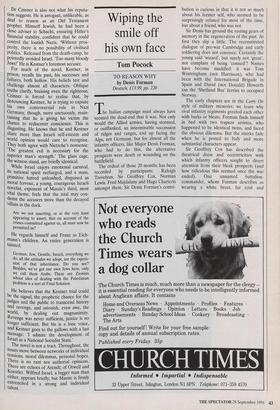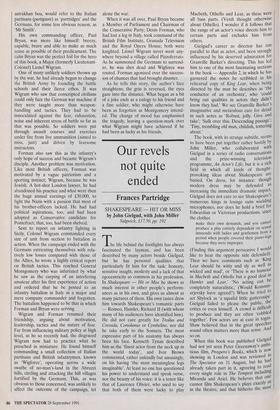Wiping the smile off his own face
Tom Pocock
TO REASON WHY by Denis Forman Deutsch, £13.99, pp. 220 The Italian campaign must always have seemed the dead-end that it was. Not only would the Allied armies, having stormed, or outflanked, an interminable succession of ridges and ranges, end up facing the Alps, not Germany, but for almost all the infantry officers, like Major Denis Forman, who had to do this, the alternative prospects were death or wounding on the battlefield.
The ordeal of those 20 months has been recorded by participants: Raleigh Trevelyan, Sir Geoffrey Cox, Norman Lewis, Fred Majdalany and Hugo Charteris amongst them. Sir Denis Forman's contri- bution is curious in that it is not so much about his former self, who seemed to he surprisingly relaxed for most of the time, but about a friend, who was not.
Sir Denis has ground the rusting gears of memory in the regeneration of the past. At first they slip a little. The reconstituted dialogue of pre-war Cambridge and early soldiering does not convince. Certainly the young said 'wizard', but surely not `great', nor complain of being 'conned'? Names have become muddled: it was Tom Wintringhasn (not Harrisson), who had been with the International Brigade in Spain and David (not Donald) Howarth ran the 'Shetland Bus' ferries to occupied Norway.
The early chapters are in the Cony On style of military memoirs: we learn why rival infantry regiments greeted each other with barks or bleats; Forman finds himself in bed with two trapeze artistes, who happened to be identical twins, and faced the obvious dilemma. But the smirks fade when he is posted to Italy and more substantial characters appear.
Sir Geoffrey Cox has described the theatrical dress and eccentricities with which infantry officers sought to divert attention from their bleak prospects (and how ridiculous this seemed once the war ended). One unnamed battalion- commander, whom Forman describes as wearing a white beret, fur coat and
astrakhan boa, would refer to the Italian partisans (partigiani) as 'partridges' and the Germans, for some less obvious reason, as `Mr Smith'.
His own commanding officer, Paul Bryan, was more like himself: breezy, capable, brave and able to make as much sense as possible of their predicament. The calm Bryan was the perfect foil for the hero of this book, a Major (formerly Lieutenant- Colonel) Lionel Wigram.
One of many unlikely soldiers thrown up by the war, he had already begun to change the British Army by founding the battle schools and their fierce ethos. It was Wigram who saw that conscripted civilians could only face the German war machine if they were taught more than weapon- handling and tactics. They had to be innoculated against the fear, exhaustion, noise and inherent stress of battle so far as that was possible. So soldiers were put through assault courses and exercises under fire from live ammunition (aimed to miss, just) and driven by fearsome instructors.
Forman also saw this as the infantry's only hope of success and became Wigram's disciple. Another problem was motivation. Like most British officers, Forman was motivated by a vague patriotism and a sporting instinct; Wigram, because he was Jewish. A hot-shot London lawyer, he had abandoned his practice and what were then the huge annual earnings of £30,000, to fight the Nazis with a passion that most of his brother-officers lacked. He had had political aspirations, too, and had been adopted as Conservative candidate for Pontefract; that, too, had been shelved.
Sent to report on infantry fighting in Sicily, Colonel Wigram commanded every size of unit from section to battalion in action. When the campaign ended with the Germans extricating themselves with rela- tively low losses compared with those of the Allies, he wrote a highly critical report on British tactics. This reached General Montgomery who was infuriated by what he saw as the carping of an interfering amateur after his first experience of action and ordered that he be posted to an infantry battalion in Italy as a major and mere company commander and forgotten. The battalion happened to be that in which Forman and Bryan were serving.
Wigram and Forman resumed their friendship, arguing about motivation, leadership, tactics and the nature of fear. Far from influencing military policy at high level, as he so recently had, the disgraced Wigram now had to practice what he preached in miniature. He found himself commanding a small collection of Italian partisans and British infantrymen, known as Wigforce', operating across a wide swathe of no-man's-land in the Abruzzi hills, circling and attacking the hill villages fortified by the Germans. This, as was obvious to those concerned, was unlikely to affect the outcome of the campaign, let alone the war.
When it was all over, Paul Bryan became a Member of Parliament and Chairman of the Conserative Party; Denis Forman, who had lost a leg in Italy, took command of the British Film Institute, Granada Television and the Royal Opera House; both were knighted. Lionel Wigram never went any- where beyond a village called Pizzoferrato. As he summoned the Germans to surrend- er, he was shot dead and Wigforce was routed. Forman agonised over the success- ion of chances that had brought disaster.
As he tells this story, the author's face straightens; the grin is reversed, the eyes gaze into the distance. What began as a bit of a joke ends as a eulogy to his friend and a fine soldier, who might otherwise have been as forgotten as Montgomery intend- ed. The change of mood has emphasised the tragedy, leaving a question-mark over what Wigram might have achieved if he had been as lucky as his friends.



































































 Previous page
Previous page